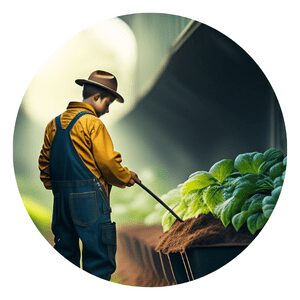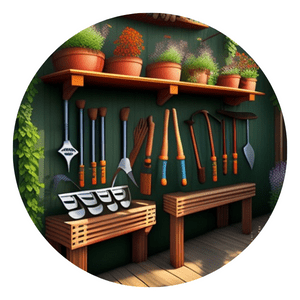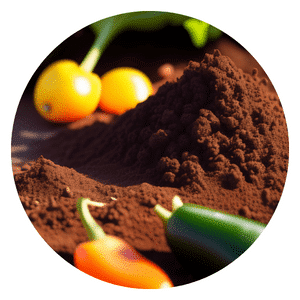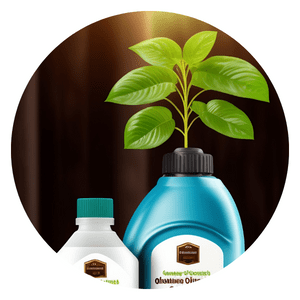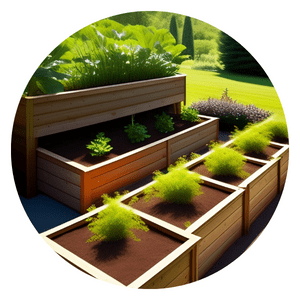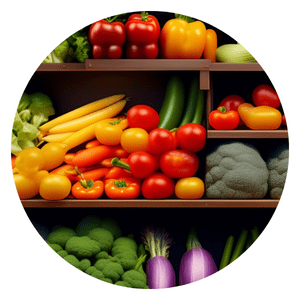Which Is The Best Organic Fertilizer?
As more and more people become aware of the negative impact of chemicals on the environment and our health, the demand for organic products has seen a significant surge. This growing trend extends to gardening as well, with an increasing number of gardeners opting for natural, eco-friendly fertilizers.
But with so many options available in the market, it can be overwhelming to determine which organic fertilizer is truly the best.
In this article, we will explore various types of organic fertilizers and delve into their benefits and drawbacks, ultimately helping you make an informed decision about which one is most suitable for your garden.
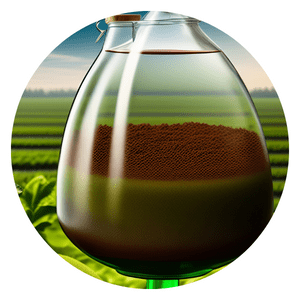
Organic Fertilizer Menu
Compost
Compost is often hailed as the black gold of organic gardening, and for good reason.
Not only does it improve soil structure by enhancing its ability to retain moisture, but it also promotes better drainage. This ensures that plants have the ideal environment for root growth, resulting in healthier and more vigorous plants.
But what sets compost apart from other organic fertilizers is its ability to add essential nutrients to the soil.
Unlike chemical fertilizers that primarily supply macronutrients like nitrogen, phosphorus, and potassium, compost provides a wide range of micronutrients as well. These micronutrients are crucial for plant health but are often overlooked – until you witness the remarkable difference they can make in your garden.
Moreover, one key advantage of using compost as a fertilizer is its sustainable nature.
Instead of depleting finite resources like mined phosphates or natural gas used in synthetic fertilizers production, composting takes advantage of organic waste materials like kitchen scraps and yard trimmings.
By recycling these materials into nutrient-rich compost, not only do we reduce waste going to landfills but also create a valuable resource that feeds both our soil and plants.
While there are several excellent options available when it comes to organic fertilizers, compost stands out for its multiple benefits beyond simply providing nutrients.
From enhancing soil structure to supplying essential micronutrients and promoting sustainability through responsible waste management practices- compost truly holds the title as one of the best all-around organic fertilizers money can’t buy.
Manure
When it comes to organic fertilizers, few options can rival the nutrient-packed power of well-rotted animal manure.
Whether it’s cow, chicken, or horse manure, these natural byproducts offer a goldmine of nutrients that can boost plant growth and improve soil health.
However, it’s important to note that using fresh or uncomposted manure directly on your plants is not recommended.
Aging or composting the manure allows harmful pathogens and weed seeds to be broken down, reducing the risk of contamination and ensuring safe application.
Manure not only supplies essential macronutrients like nitrogen, phosphorus, and potassium but also enriches the soil with micronutrients such as magnesium, calcium, and zinc. These nutrients are crucial for healthy plant development and support various metabolic processes within plants.
Additionally, animal manures contribute organic matter to the soil which enhances its structure, promotes moisture retention capabilities and encourages beneficial microbial activity.
One key advantage of well-rotted animal manure is that it can significantly enhance soil fertility in both sandy soils with poor water-holding capacity or heavy clay soils prone to compaction.
The organic matter in aged manure acts as a sponge-like substance in sandy soils by improving water-retention capabilities while mitigating drainage issues common in these types of soils.
In clay soils where compaction restricts root growth and reduces nutrient availability to plants, incorporating well-rotted animal manure helps break up dense clumps and improve overall soil structure.
Bone Meal
Bone meal is a valuable addition to any organic garden.
Aside from being a slow-release fertilizer, it also provides the much-needed phosphorus for optimal flowering and fruiting. This nutrient is essential for strong roots, which in turn support healthy plant growth.
By adding bone meal to your soil, you are ensuring that your plants have the necessary building blocks to develop vibrant blossoms and delicious fruits.
What sets bone meal apart from other fertilizers is its ability to promote flower and fruit development.
Phosphorus plays a crucial role in the production of energy in plants, particularly during periods of high demand such as flowering or fruiting.
By providing an ample supply of phosphorus through bone meal, you are giving your plants the boost they need to produce bountiful blooms and abundant harvests.
Moreover, bone meal offers additional benefits beyond its high phosphorus content.
It has been found to improve soil structure over time by enhancing water retention and drainage capabilities. This not only benefits the current crop but also lays the foundation for healthier plants in future seasons.
The slow-release nature of bone meal ensures that it continues to nourish your garden throughout the growing cycle, reducing the need for frequent reapplication.
In conclusion, when considering which organic fertilizer is best for your garden’s needs, don’t overlook the advantages of using bone meal. Its high phosphorus content promotes root strength and boosts flower and fruit development like no other fertilizer can
In fields where nature's love bestows its art, A question lingers, which fertilizer to impart? Amidst the organic realm, choices arise, A dance of nutrients beneath the skies. From castings rich, worms weave their magic deep, To seaweed's embrace, where minerals seep. But in the heart of soil, secrets unfurl, For the best organic fertilizer is simply nature's pearl.
Chappy The Gardener
Blood Meal
One organic fertilizer that stands out for its ability to promote lush leafy growth is blood meal.
Derived from dried animal blood, particularly from cows or pigs, it’s packed with nitrogen, making it an ideal choice for plants like lettuce, spinach, and brassicas.
Nitrogen is a vital nutrient for plants as it plays a crucial role in the formation of chlorophyll, which is responsible for the vibrant green color seen in foliage.
What sets blood meal apart from other nitrogen-based fertilizers is its slow-release nature. This means that instead of providing an immediate burst of nutrients to your plants, they will receive a steady supply over time.
The gradual release allows roots to absorb the nutrients more efficiently and reduces the risk of burning or damaging the plant’s delicate foliage. Additionally, this method ensures sustainable nutrition and long-lasting effects on plant growth.
It’s important to note that while blood meal can be highly beneficial in promoting leafy green growth, it should be used with caution and in moderation.
Adding too much can lead to excessive nitrogen levels in the soil, which may stunt root development and encourage imbalanced growth patterns.
To maintain overall soil health and prevent nutrient imbalances, consider incorporating other organic fertilizers into your routine or consult with a professional gardener or agricultural specialist for personalized advice.
Fish Emulsion
Fish emulsion is a hidden gem in the world of organic fertilizers.
Made from fish byproducts, this liquid fertilizer packs a punch in terms of nitrogen content, making it an excellent choice for plants that need a quick nutrient boost.
One of the great advantages of fish emulsion is its versatility – it can be used on both potted plants and seedlings, making it an essential tool for gardeners with a variety of plant types.
What makes fish emulsion unique is its ability to work quickly to nourish plants.
As soon as it’s applied to the soil, the high nitrogen content gets to work, encouraging healthy leaf growth and overall plant vigor. This rapid absorption also means that the effects are visible within days, allowing you to see the impact of your fertilizing efforts sooner than with other organic options.
Another advantage of fish emulsion is its sustainability. By utilizing fish byproducts that would otherwise go to waste, this fertilizer helps reduce overall waste and supports sustainable practices in fisheries.
Choosing fish emulsion not only benefits your plants but also contributes to a more environmentally conscious approach to gardening.
When considering organic fertilizers for your garden or indoor plants, don’t overlook fish emulsion. It offers an array of benefits such as high nitrogen content, fast-acting results, and sustainable sourcing.
Whether you’re tending potted plants or nurturing delicate seedlings, incorporating fish emulsion into your gardening routine may just give you the extra boost you need for thriving greenery
Seaweed or Kelp Meal
Seaweed or kelp meal may not be the first thing that comes to mind when thinking about organic fertilizers, but it is certainly one of the most beneficial options available. This natural fertilizer is packed with micronutrients, growth hormones, and trace elements that plants need for optimal growth.
These essential nutrients help plants develop strong root systems, improve flowering and fruiting, and enhance overall plant health.
What makes seaweed or kelp meal particularly impressive is its ability to promote resilience in plants. It acts as a natural plant stimulant, increasing their tolerance to environmental stressors such as drought, heatwaves, and disease.
Additionally, seaweed or kelp meal improves soil structure by increasing microbial activity and nutrient availability. This means healthier soil for your plants to grow in and better nutrient uptake by their roots.
So why choose seaweed or kelp meal over other organic fertilizers? It’s simple – this nutrient-rich option not only nourishes your plants but also strengthens them from within.
By incorporating this natural fertilizer into your gardening routine, you’ll be giving your plants the best chance at thriving in any environment while maintaining a sustainable approach to gardening.
Greensand
Greensand is a hidden gem in the world of organic fertilizers. While many gardeners are familiar with common additives like compost or manure, greensand often remains overlooked.
Yet, this natural mineral fertilizer offers numerous benefits that make it worthy of consideration.
In addition to being rich in potassium, greensand contains various essential minerals such as iron and manganese, which are crucial for plant growth. This nutrient-rich composition provides a unique advantage by not only improving soil structure but also promoting long-term nutrient release.
One key benefit of greensand is its ability to improve soil structure.
When added to the soil, greensand works as a granular material that helps loosen compacted dirt and create an ideal environment for root growth.
It acts as a natural binder that binds together particles into aggregates while allowing space for air and water circulation. Moreover, the unique moisture-retaining properties of greensand help to prevent excessive dryness and retain essential nutrients within reach of plant roots.
Another standout feature of greensand is its slow-release nature.
Unlike synthetic fertilizers that quickly dissolve when applied, greensand provides sustained nutrition over an extended period. The minerals found in greensand are released gradually as they break down naturally in the soil, supplying plants with the nutrients they need over time while minimizing the risk of nutrient leaching or burnout due to excess application.
In conclusion, incorporating greensand into your gardening routine can have transformative effects on your plants and overall soil health
Rock Phosphate
Rock phosphate is a powerhouse when it comes to providing plants with phosphorus.
Unlike synthetic fertilizers that provide an instant surge of nutrients, rock phosphate is a slow-release source. This means that the nutrients are released slowly over time, ensuring a continuous supply for plants throughout their growth cycle. This is particularly beneficial for root development and flowering plants, as they require a steady supply of phosphorus to establish strong root systems and produce vibrant flowers.
What sets rock phosphate apart from other organic fertilizers is its natural composition. It contains high levels of calcium and trace minerals, which are essential for overall plant health.
The slow-release nature of rock phosphate also prevents the risk of nutrient leaching or runoff into water bodies, making it an environmentally friendly choice for gardeners.
Furthermore, studies have shown that the use of rock phosphate in soil can improve its structure by promoting microbial activity and enhancing nutrient availability.
In addition to its benefits for plants, using rock phosphate as an organic fertilizer supports sustainable agricultural practices.
As a non-renewable resource, the mining and extraction of rock phosphate can have negative environmental impacts if not done responsibly.
By choosing certified organic brands that prioritize sustainable sourcing methods such as those derived from recycled materials or produced from mines committed to reclamation efforts, gardeners can contribute to minimizing these adverse effects.
Overall, incorporating rock phosphate into your gardening routine provides numerous benefits for both plants and the environment.
Worm Castings
Worm castings may not be the first thing that comes to mind when considering organic fertilizers, but they are undoubtedly one of nature’s hidden treasures. These nutrient-rich byproducts of vermicomposting have gained popularity among gardeners and farmers alike for their ability to improve soil structure and provide a balanced mix of essential nutrients.
But what sets worm castings apart from other organic fertilizers?
One key advantage is the presence of beneficial microorganisms in worm castings. These microorganisms help break down organic matter further, making nutrients more readily available to plants.
Additionally, these microorganisms contribute to the overall health of the soil, promoting biodiversity and preventing harmful pathogens from taking hold.
Another unique aspect of worm castings is their ability to enhance soil structure.
The tiny particles that make up worm castings are crumbly, creating air pockets in the soil that improve drainage and aeration. This is especially beneficial for plants with delicate root systems as it allows them to access water and nutrients more efficiently.
Moreover, worm castings contain a wide array of essential macro and micronutrients necessary for plant growth.
Unlike synthetic fertilizers that often provide an unbalanced nutrient profile, worm castings offer a naturally balanced mix that aligns with plant needs. This ensures healthy development without causing excessive nutrient buildup or leaching.
In conclusion, while there are many effective organic fertilizers available on the market today, worm castings stand out for their unique properties.
Cover Crops
Cover crops have long been championed as an effective and organic method to replenish the soil with much-needed nutrients.
Among the many options available, clover and legumes are often favored for their ability to fix atmospheric nitrogen and improve soil fertility. The beauty of these cover crops lies in their symbiotic relationship with bacteria called rhizobia, which colonize their roots and convert nitrogen gas into a usable form for plants.
As a result, not only do cover crops enrich the soil with nitrogen, but they also increase its organic matter content, leading to improved structure, water-holding capacity, and overall health.
One of the key benefits of planting cover crops like clover or legumes is that they work towards reducing reliance on synthetic fertilizers.
By utilizing natural methods to fix nitrogen from the air and make it available to other plants in need, farmers can significantly lower their fertilizer expenses while still achieving healthy crop yields. This shift towards more sustainable farming practices not only saves money but also protects water quality by reducing runoff of excess nutrients like nitrate into nearby streams or rivers.
Furthermore, cover crops offer additional perks beyond just enriching the soil. They act as living mulch during times when primary cash crops are not being grown, preventing erosion by protecting bare ground from wind or water damage.
Additionally, cover crop foliage can suppress weeds by outcompeting them for light and resources while acting as a natural barrier between potential pests and crop plant.
In conclusion, there is no one-size-fits-all answer to the question of which is the best organic fertilizer.
Each type of organic fertilizer has its own unique benefits and drawbacks, and the best choice will depend on factors such as the specific needs of your plants, your gardening practices, and your personal values.
It is important to consider factors such as nutrient content, release rate, environmental impact, and cost when making a decision.
Ultimately, it may be beneficial to experiment with different types of organic fertilizers to find the one that works best for you.
Remember to always follow the instructions provided by the manufacturer and consult with experts or experienced gardeners for further guidance. Happy gardening!
Click To Grow
Helps Us Grow – Share If You Like


